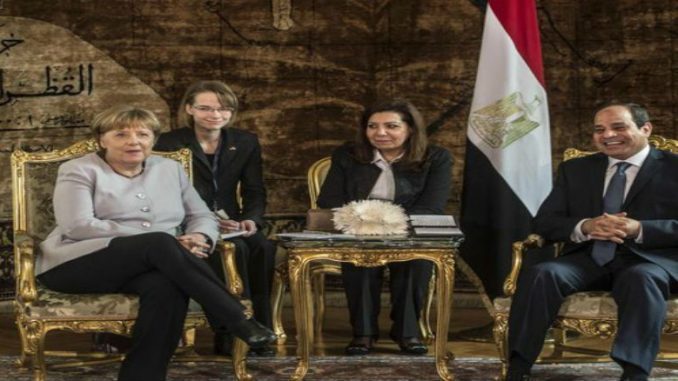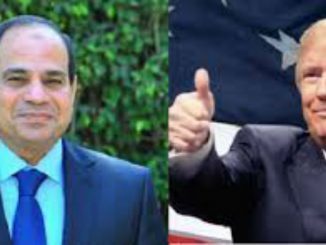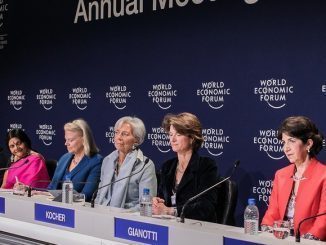
Chancellor Angela Merkel has been harshly criticized for her visit to Egypt’s military regime which is known for its deteriorating human rights conditions under its military ruler, General Abdel Fattah al-Sisi.
In this context, the European Council on Foreign Relations (ECFR) sent an open letter that condemned Merkel’s endorsement of Sisi’s government saying that even if ” it is natural that you should seek Egypt’s cooperation on issues of direct importance to Germany, including migration, security, economic ties and regional issues. At the same time, it would not serve German or European interests to neglect the serious concerns raised by Egypt’s current direction and the potential dangers that it involves.”
Moreover, the ECFR letter that although Egypt has taken a number of economic reforms but there are few prospects for successful cooperation and large risks of future instability under Abdel Fattah al-Sisi’s rule.
It added that there are few signs that the leadership has the vision to pull Egypt out of a slow-motion economic crisis that combines high unemployment, crippling debt, a rising cost of living and grossly inadequate public services.
It is all about military rule in Egypt :
The European Council Foreign Relation’s letter pointed to the reason behind its pessimistic view regarding Egypt’s future.
In its letter the ECFR said that policy making in Egypt” is concentrated in a narrow circle of military advisors and civilian experts are largely dis-empowered.”
Abdel Fattah al-Sisi has often called in the military to assist in major infrastructure projects and with distribution of subsidized commodities to keep a lid on rising prices amid an acute shortage of dollars.
“Business, civil society and political parties are systematically marginalized, and the most vocal among them are often silenced,” the ECFR letter reads.
Regarding human rights conditions and rights groups in Egypt, only a few days before your visit, the Egyptian authorities “shut down a leading anti-torture NGO, the Nadeem Center for the Rehabilitation of Victims of Violence, while a rare opposition voice, Anwar al-Sadat, has been disbarred as a member of parliament.”
Al-Sisi’s narrow and over-securitised way of ruling has led to a decline in state effectiveness, which means that the government is often unable to follow through in cooperation on projects agreed with international partners.
Moreover,” Rising hardship and the repressive policies pursued by security services have weakened the country’s social contract”, which is one of the main norms that has been deeply rooted in Europe’s democracy.
The ECFR also expected that the North African country will live under an era of instability saying that “Even if there are few signs of any imminent large-scale protests, the mounting pressures on the population are storing up trouble for the future.”
It also highlighted the notion that would justify Merkel’s visit to Egypt under the banner of partnership on immigration and other issues saying that this should not be the case. It said,”While Germany and the EU seek an increased partnership on migration and other issues, this should not be approached as if Europe needs cooperation more than Egypt does.”
Egypt is most likely EU partner in economic development and modernization, and improved arrangements for handling the movement of people through and from Egypt should be part of this dialogue – “but not at the expense of broader concerns,” said the ECFR .
It also urged Germany and Europe to signal to al-Sisi that a change of direction in Egypt is necessary.
“Reining in abusive security forces, widening consultation and representation in policy making, and opening political space are necessary to set the country on a credible path to reform and stabilize it in the longer term,” the ECFR letter said.
It also pointed to the idea of good governance as the core solution for illegal migration rather than treaties and unconditional visits that wouldn’t offer a decisive solution to Europe’s major problem and thus, its security.
The letter reads, “This in Europe’s interest: further deterioration in political and social conditions can only lead to higher outflows of migrants and insecurity to the EU.”
It added that the continuous regime’s repressive approach “means that any endorsement of al-Sisi’s as a respectable international leader comes at the expense of the liberal democratic values that Europe seeks to uphold.”
In the end of the letter, the ECFR sounded the alarm of danger if Germany appears to offer al-Sisi uncritical endorsement, saying that” it would only encourage him to persist on a path that will not fulfill the Egyptian people’s aspirations or promote European interests over the longer term.”
It continued that uncritical engagement with Egypt’s al -Sisi is not realpolitik as” it is not based on a realistic assessment of the dangerous mixture of repression and non-inclusive governance that currently prevails.”
The only way that Germany, and Europe, should engage with Egypt when it is “as a plural and vital country, not just with its regime,”said the ECFR.
Busines, illegal migration, regional issues underscore human rights violations during Merkel’s visit to Egypt
The German Chancellor Angela Merkel visited Egypt on 2-3 March, which is her first official visit to the country,where she met Abdel Fattah al-Sisi.
In her visit, Merkel focused on limiting the migrant flows to Europe through North Africa, especially chaos-torn Libya.
Since the overthrow of Muammar al-Qaddafi in 2011 turmoil exploited by people smugglers has turned Libya to the main gateway for African migrants seeking to make dangerous Mediterranean crossings.
Moreover, Egypt also has become one of the dangerous spots used by migrants to sneak to European borders. Bigger boats are increasingly setting out from Egypt for sea voyages of up to 10 days toward Italy, as the EU, NATO and Turkish coast guard tighten controls in the Aegean Sea after Brussels and Ankara reached a deal to keep refugees in Turkey in exchange for 6 billion euros in aid and eventual visa-free travel for Turks visiting the EU.
It is worth to mention that Merkel, who faces elections in September, has been under intense pressure to reduce the number of asylum seekers coming to Germany, which has taken in over one million migrants since 2015.
In this context, the German government has urged the North African states to step up border controls and speed up repatriations of migrants whose asylum applications are rejected.
Merkel was also joined by a business delegation that could sweeten the diplomacy with investments badly needed by Egypt, which suffers wrecked economies, terrorist attacks and high unemployment, especially among youths.
The German government spokesman Steffan Seibert said, “The chancellor will speak with al-Sisi about, among other things, economic cooperation and opportunities for German companies.”
Regarding regional issues , Merkel focused on promoting political stability in Libya crisis as its is the first step toward limiting human traffickers activities through its borders.
She said in her weekly podcast,“Without a political stabilization of Libya, we won’t be able to stop the human traffickers operating out of Libya who are responsible for by far the most arrivals in Italy.”
Accordingly, Merkel’s visit to Egypt that will followed by a trip to Tunisia will focus on their troubled neighbor Libya, a largely lawless country that has porous desert borders with Algeria, Niger, Chad and Sudan.
These visits are part of a larger diplomatic initiative by Merkel last year who visited Mali, Niger and Ethiopia.
In fact, “illegal migration” issue was on Merkel’s top priority list during her visit to Egypt as the German Chancellor is under huge pressure at home to achieve results regrading this issue in the election year, as the anti-immigration Alternative for Germany party hopes to enter the national parliament for the first time.
Several terrorist attacks hit Germany last year especially the truck rampage by Tunisian immigrant Anis Amri at a Berlin Christmas market that killed 12 people in December.
In fact, Merkel’s interior minister had a previous idea for North African countries to build holding centers for returned migrants, but it has been rejected by Merkel’s center-left coalition partners and by rights groups.
Foreign Minister Sigmar Gabriel ,whose Social Democrats hope to topple Merkel this year , dismissed the idea, saying: “I doubt that all this has been really thought through.”
In the same context,Human Rights Watch said,”Egypt banned protests and jailed thousands of people, while outlawing the Muslim Brotherhood movement president Muhammad Morsi whom al-Sisi, a former army chief, overthrew in 2013.”
The New York-based rights group said that repatriating Tunisians and Egyptians who do not need protection can be “legitimate” if they are treated fairly.
Judith Sunderland, a Europe and Central Asia director for the HRW said,“It’s another thing entirely to pursue dodgy deals that could trap asylum seekers and migrants from elsewhere in countries like Tunisia and Egypt that cannot guarantee decent treatment or meaningful access to asylum.”
On the other hand, Germany has implemented a double standard policy towards Turkey while it turned a blind eye to human rights violations in Egypt’s al-Sisi regime that hiked in an unprecedented way.
Last year, Germany initiated an EU agreement with Ankara that helped sharply reduce the influx of migrants through Turkey and western Balkan countries, but Germany didn’t leave any chance to raise its concerns about human rights in Ankara.
Egyptian-German relations
Egypt and Germany have strengthened their relations in the past few years.
Since 2014, Germany and Egypt have been working on a security cooperation agreement.
Al-Sisi met with the German chancellor in May 2015 during his first official visit to Europe.
Moreover, many German officials have visited Egypt last year.
German Interior Minister Thomas de Maiziere has met with his Egyptian counterpart Magdy Abdel Ghaffar multiple times last year.
Maiziere has called Egypt an “indispensable ally in the fight against terrorism and illegal immigration.”
During the visit at the end of March, Maiziere discussed ways to enhance cooperation in areas such as security, counter-terrorism, airport security, and immigration.
Moreover, German vice-chancellor and minister of economic affairs Sigmar Gabriel announced that potential arms deal with Egypt during a press conference held in Cairo in April 2016.
Gabriel said at the press conference that “The Egyptian government did not ask Germany for a weapons deal during this visit, but there was a discussion about supplying two naval submarines. We are ready to fully cooperate with Egypt to secure its borders with Libya.”
In this context, Egypt and Germany have signed a number of security cooperation agreements last July.
The agreements address a number of areas, including illegal immigration, counter-terrorism, and securing airports.
In this context, Egypt’s Minister of Interior Abdel Ghaffar signed an intelligence-sharing agreement, an extradition agreement including Interpol Red Notice warrants and an agreement that would see Germany train Egyptian security personnel to investigate financial crimes.
Germany also announced a naval submarine deal with Egypt in 2012. Under the initial terms of the agreement, Germany would export four state-of-the-art military submarines to Egypt.
Last December, Germany handed over the first two submarines to Egypt.
Moreover, Merkel and Al-Sisi discussed in a phone call cooperation in counter-terrorism efforts as well as recent regional and international development last January.
In addition, at an earlier time this year, Germany also removed restrictions on flights to South Sinai which was implemented in 2015 after a Russian passenger jet crashed shortly after taking off from Sharm El-Sheikh International Airport.
According to a foreign ministry statement,Germans accounted for the greatest number of tourists to visit Egypt in 2016, at 655,000 people.



